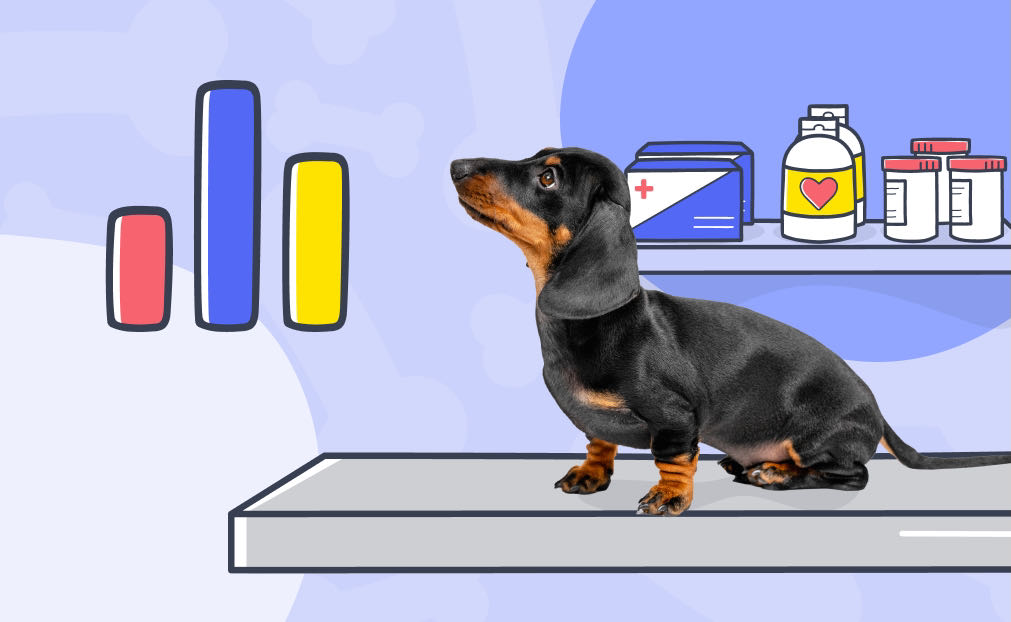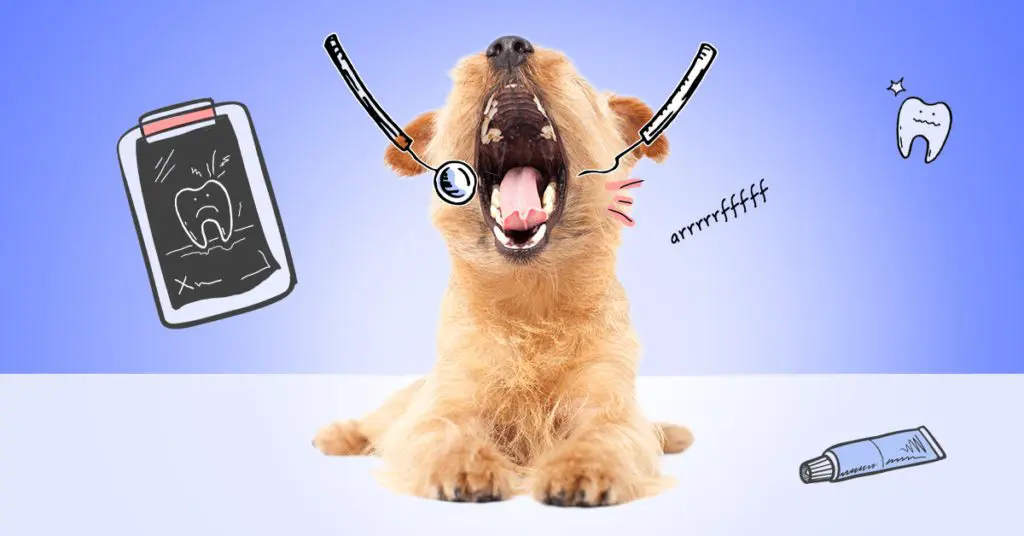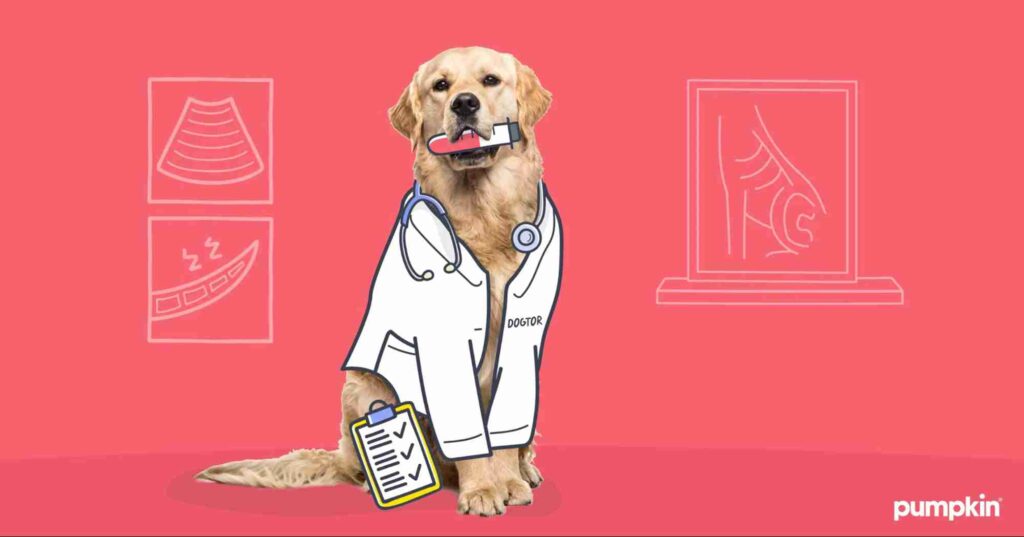Key Points
- Common canine illnesses include gastrointestinal issues, skin problems, allergies, ear infections, dental disease, and cancer.
- Some dog diseases, such as giardia and respiratory infections, are preventable with proper hygiene, vaccinations, and regular vet care.
- Chronic conditions like periodontal disease develop with age, making routine check-ups essential.
Just like people, dogs get sick too — and it’s not always easy to tell when something is wrong. Dogs are great at hiding pain, which is why it’s so important for pet parents to recognize the symptoms of the most common dog diseases. Whether it’s a slight change in energy levels or more obvious symptoms like vomiting, your dog depends on you to watch out for their health.
The most common diseases among Pumpkin pups
We reviewed data from more than 124,000 Pumpkin pet insurance claims to find the most common illnesses in dogs. Based on claims filed with Pumpkin between June 2022 and December 2024, the top disease diagnoses in dogs were:
- Allergies
- Gastrointestinal issues
- Cancer
- Ear infections
- Urinary tract infection
- Inflammatory bowel disease
- Periodontal disease
- Giardia
- Canine respiratory diseases
- Intervertebral disc disease
While these are the most common diagnoses among Pumpkin’s pups, are they the most common canine diseases overall?
Remember, pet insurance providers require that dogs get vaccinated against diseases like rabies, parvovirus, and distemper. In addition to these core vaccines, dogs can also be vaccinated against illnesses such as Lyme disease and kennel cough. Among unvaccinated dogs, these diseases are more common.
Let’s dive into common canine illnesses, their symptoms, and how you can help your dog avoid them.
With a Pumpkin Dog Insurance plan, 90% cash back on eligible vet bills is an option for everyone. Don’t wait to protect your pup — fetch a free quote today!
1. Allergies
Does your dog scratch incessantly or lick their paws until they’re red? Allergies are one of the most common reasons pet owners visit the vet, with more than 25,000 insurance claims for allergies filed to Pumpkin between June 2022 and December 2024. Allergies can stem from environmental triggers like pollen, certain foods, or even flea bites.
Symptoms
- Constant licking of paws or scratching at the ears
- Red, irritated patches of skin, often called “hot spots”
- Chronic ear infections or watery, itchy eyes
Treatment
Your vet will work to identify the allergen and recommend the right treatment, whether it’s antihistamines, steroids, or even allergy shots. For food allergies, you may need to try a food elimination diet or switch to a hypoallergenic dog food.
Prevention
- Use flea preventatives; flea saliva is a major allergen
- Regularly clean your dog’s bedding, toys, and favorite lounging spots to reduce exposure to environmental allergens like dust and pollen
- Work with your vet to identify potential food sensitivities
2. Gastrointestinal issues
GI issues are wide-ranging. Common symptoms like vomiting could be a sign of a serious illness such as inflammatory bowel disease — or maybe your pup snuck some food off your plate when you weren’t looking. If your dog is experiencing diarrhea, this problem often resolves on its own in a day. However, if GI problems worsen, your dog can’t keep anything down, you see blood in their feces, or your dog displays other worrying symptoms, call your veterinarian for help.
Symptoms
- Diarrhea
- Vomiting
- Loss of appetite
- Loose or runny stool
Treatment
Often, simple cases of GI distress resolve on their own. However, if the symptoms point toward a larger health problem, your veterinarian may prescribe additional treatment such as medications, intravenous fluids, or a change in diet.
Prevention
Feed your dog a complete and balanced dog food, refrain from changing their diet too often, and maintain an active lifestyle to support their overall health. Keep snacks and treats to no more than 10% of their daily calories, and do your best to stop your dog from sneaking fatty and seasoned human foods that will upset their tummy. Remember that some human foods — grapes, chocolate, some types of nuts, onions, garlic — are toxic to dogs.
3. Cancer
Hearing the word “cancer” can be devastating, but not all diagnoses are life-threatening. Some common forms of cancer, including mast cell tumors, often have a good prognosis. Early detection and treatment can also give your dog a fighting chance against more dangerous types of cancer. Senior dogs and certain breeds are at a higher risk for common dog diseases like cancer, but vigilance can make all the difference.
Symptoms
- Lumps or bumps that change in size or shape
- Sudden weight loss or loss of appetite
- Lethargy or unusual behavior
- Wounds that don’t heal or unusual bleeding
Treatment
Treatment options range from surgery to remove tumors to chemotherapy or radiation therapy. If the cancer isn’t curable, palliative care can help your dog stay comfortable.
Prevention
- Perform regular at-home checks for unusual lumps and bumps
- Schedule annual wellness exams, especially for older dogs
- Feed your dog a nutrient-rich diet and maintain an active lifestyle to support their overall health
4. Ear Infections
Ear infections aren’t just uncomfortable for dogs, they can be downright painful. Dogs with floppy ears, like Cocker Spaniels and Basset Hounds, are especially prone because their ear shape traps moisture and creates the perfect breeding ground for bacteria and yeast.
Symptoms
- Frequent head shaking or pawing at their ears
- A strong, unpleasant smell coming from their ears
- Redness, swelling, or discharge in the ear canal
- Sensitivity when you touch your dog’s ears
Treatment
Your vet will likely clean the ear canal and prescribe medicated ear drops. For severe infections, oral antibiotics or antifungal medications may be necessary.
Prevention
- After a swim or bath, dry your dog’s ears thoroughly
- Clean their ears regularly using a vet-recommended ear cleaner
- If your dog has floppy ears, check them weekly for signs of redness or irritation

5. Urinary Tract Infection (UTI)
Accidents in the house or straining to pee could signal a urinary tract infection (UTI). While it’s easy to dismiss these symptoms as behavioral, UTIs are one of the most common diseases in dogs and may lead to more serious problems like kidney infections. Older female dogs are particularly at risk, but any dog can develop a UTI.
Symptoms
- Frequent urination or accidents in the house, even if your dog is well-trained
- Straining or discomfort while urinating
- Blood in the urine or a noticeable strong odor
Treatment
Your vet will perform tests to confirm the infection and prescribe antibiotics. Pain relief medication may also be necessary, and increased water intake is often recommended to flush out bacteria.
Prevention
- Ensure your dog has constant access to fresh, clean water
- Take them out for regular bathroom breaks to help prevent urine buildup
- Keep their genital area clean, especially for long-haired breeds
6. Inflammatory Bowel Disease (IBD)
IBD is a chronic condition that causes inflammation of the digestive tract, leading to gastrointestinal issues. This common dog disease can make mealtimes and digestion a challenge for your pup. It’s often linked to an overactive immune response, dietary triggers, or genetics.
Symptoms
- Chronic diarrhea or vomiting that doesn’t seem tied to specific foods
- Loss of appetite or weight loss despite eating normally
- Occasional discomfort or lethargy after meals
Treatment
Treatment typically involves dietary management, like switching to a hypoallergenic or easily digestible diet. The vet may prescribe anti-inflammatory drugs or antibiotics to control flare-ups.
Prevention
- Feed your dog a high-quality, balanced diet free of unnecessary additives
- Be mindful of any signs of digestive distress and consult your vet early
7. Periodontal Disease
Dental health is often overlooked (in humans and dogs alike), and periodontal disease remains one of the most common diseases in dogs. It’s a progressive condition caused by plaque buildup and poor oral hygiene, leading to inflamed gums, tooth loss, and even systemic infections if bacteria enter the bloodstream.

Symptoms
- Persistent bad breath (beyond typical “doggy breath”)
- Red, swollen, or bleeding gums
- Difficulty eating or a reluctance to chew
- Loose or missing teeth in severe cases
Treatment
Treatment begins with a professional dental cleaning under anesthesia. Severe cases may require tooth extractions, and antibiotics might be prescribed to combat infections.
Prevention
- Brush your dog’s teeth daily with dog-safe toothpaste
- Provide dental chews or toys to reduce plaque
- Schedule regular dental checkups with your vet
8. Giardia
This pesky parasite is more common than you might think, especially in dogs who love to explore puddles or unclean water sources. Giardia can wreak havoc on your dog’s digestive system and is particularly concerning for puppies or immunocompromised dogs.
Symptoms
- Foul-smelling, greasy diarrhea that may be frothy or contain mucus
- Vomiting and loss of appetite
- Dehydration or noticeable weight loss in severe cases
Treatment
Your vet will prescribe an anti-parasitic medication to clear the infection. Supporting your dog with a bland diet and plenty of water will also help during recovery.
Prevention
- Avoid letting your dog drink from puddles, lakes, or stagnant water
- Provide your dog with clean, fresh water at all times
- Clean up waste immediately to reduce the risk of contamination
9. Canine respiratory diseases
Coughing in dogs might seem like no big deal at first, but it can actually be a sign of something more serious, including common dog diseases like kennel cough or canine influenza. These respiratory infections spread quickly, especially in places where dogs socialize, like parks or boarding facilities.
Symptoms
- A loud, honking cough that might sound like choking
- Runny nose or watery eyes
- In some cases, a mild fever or loss of appetite
Treatment
Mild cases often resolve on their own, but your vet may recommend antibiotics for bacterial infections or cough suppressants to ease symptoms. Isolation from other dogs is essential to prevent spreading the disease.
Prevention
- Vaccinate against Bordetella and canine influenza.
- Avoid crowded dog spaces during outbreaks.
- Keep your dog’s bowls, bedding, and toys clean to reduce exposure to germs.
10. Intervertebral Disc Disease (IVDD)
IVDD in dogs is a spinal condition that primarily affects breeds like Dachshunds, Corgis, and French Bulldogs. It can lead to sudden back pain, difficulty walking, or even paralysis in severe cases.
Symptoms
- Stiffness, reluctance to move, or obvious back pain
- Difficulty walking or dragging hind legs
- Yelping when picked up or touched along the spine
Treatment
Treatment depends on the severity. Rest and anti-inflammatory medications are often the first steps. In more severe cases, surgery might be necessary to relieve spinal pressure and restore mobility.
Prevention
- Avoid letting your dog jump on or off furniture; use ramps or stairs instead
- Maintain a healthy weight to reduce strain on their spine
- Monitor at-risk breeds closely for early signs of discomfort

Protect your pup against common dog diseases
Keeping your pup healthy can come with surprises — like vet bills that stack up fast, from prescription medications to major treatments. Vaccinations and check-ups are great for prevention, but when the unexpected hits, a solid pet insurance plan is your secret weapon. With Pumpkin Dog Insurance plans, you can say yes to top-notch care and skip the financial stress — because your best friend deserves nothing less.




